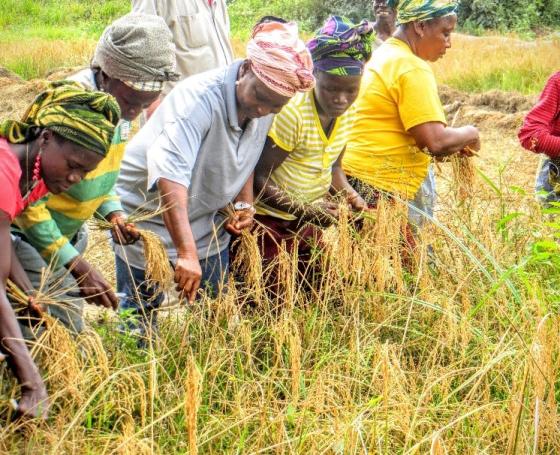Liberia: US$4M for Farmers, Value Chain Actors

— Weah announces in Annual Message to Legislature
In bid to increase productivity in the agricultural sector of Liberia, President George M. Weah has announced the disbursement of US$4 million to assist beneficiaries.
Delivering his 6th annual message to the 54th Legislature on January 30, the President said the amount has been approved to benefit primarily farmers and processors of the rice, cassava and vegetable value chains.
“I am pleased to report that US$4 million out of the total of US$41.5 million has already been approved for disbursement to selected beneficiaries particularly farmers and processors from rice, cassava, and vegetables,” he said.
The President did not specifically mention the source of the funds. However, he said that the Liberian government has secured money from international partners to assist people within the agricultural sector.
He said a few years ago, his government launched the Liberia Agriculture Commercialization Fund (LACF) to assist beneficiaries.
LACF is a component of the World Bank and the International Fund for Agricultural Development (IFAD), at the Ministry of Agriculture.
In recent years the program disbursed US$2 million as grants to several beneficiaries to address challenges facing their farming businesses.
According to the President, the LACF initially assisted targeted beneficiaries, mainly rice vegetables and oil palm, but with additional funding being attracted by the government, the program has now expanded to other value chains such as livestock, rubber and cassava.
“I am happy to report that last year was a high-performing period for our agriculture sector, where more focus was placed directly on impacting rural and urban farmers, as well as those in the agricultural value chains,” he said.
President Weah has, in several of his annual messages to the Legislature, pronounced agriculture as a priority of his administration. However, public funding for the sector has been lacking or limited since he took office in 2018.
“During my last address to this Honorable Legislature, I informed you that agricultural productivity would be a key priority of this Administration,” he mentioned in the last annual address to members of the Legislature.
The Weah administration has drastically reduced the budget for agriculture since his administration began. He promised that more money could be added in the national budget for critical areas of the economy such as agriculture but this has not happened.
Agriculture still remains largely donor driven. The 2023 national budget the government has allotted only 1 percent of the total national budget for agriculture, far below the benchmark of the Malabo framework for food and nutrition security which calls for 10 percent of the total budget of every African government.
He said under his administration, the agricultural sector now enjoys the confidence of donors, whose support and presence allow for greater production of rice and other crops, as well as the employment of climate-smart agricultural practices that help mitigate the impacts of climate change on farmers.
Notwithstanding, agriculture and food security still remain a very serious challenge under the Weah administration. Because of the lack of or limited funding to the sector, Liberia is far from becoming self-sufficient in the production of food. The country is currently experiencing a food crisis.
A recent survey conducted by the government shows that 47% of households (approximately 2.2 million people) are food insecure. The highest levels of food insecurity were reported in Sinoe (67%), Lofa (67%), Maryland (65%), Grand Cape Mount (65%), and Bong (64%) counties. An estimated 8% of households are severely food insecure and at risk of very high acute malnutrition and need urgent attention. Moreover, urban populations are becoming increasingly food insecure (45%), the report said.
Weah informed his audience that U.S. President Biden’s administration has recently named Liberia as one of very few African countries to be a beneficiary of the U.S. Feed The Future program, which is the American government's flagship global food security initiative.
The President said to demonstrate his commitment to ensuring food security, he has introduced several policies such as Executive Orders to suspend the tariff on rice imports and an Executive Order to lift import tariff on agricultural materials.
To further increase agricultural productivity, the President said that his government last year launched the Accelerated Community Development Program (ACDP).
He said that the program will be used as a channel to increase agricultural productivity also for farmers. It is being implemented in partnership with the UNDP, budgeted at US$100 million.
According to him the program seeks to create more jobs and reduce poverty and inequality in some of the poorest rural and urban communities in Liberia.
“As I stated at the launch, our aim is for the ACDP to become our largest national program investing in community development. Over the next few years, our Ministries and Agencies — specifically the Ministry of Agriculture, the Ministry of Public Works, the Ministry of Internal Affairs, the Ministry of Education, the Ministry of Health, and the Water and Sanitation Commission, and others — will collaborate with UNDP and other development partners such as the World Bank, to invest in constructing agricultural feeder roads, water and irrigation systems for farmers, hydro power plants, sanitation facilities, and markets to serve local communities,” he explained.
He said the ACDP will comprise agricultural hubs equipped with food storage facilities, machines, schools and health centers, boreholes, and hand pumps placed in hard-to-reach communities across Liberia.
“We will also be providing agricultural tools, tractors, and farm equipment to help our farmers and cooperatives increase their productivity and improve their livelihoods,” he said.
He announced that the initial US$14.5 million has been secured for the program, and work is now starting in 18 communities.
